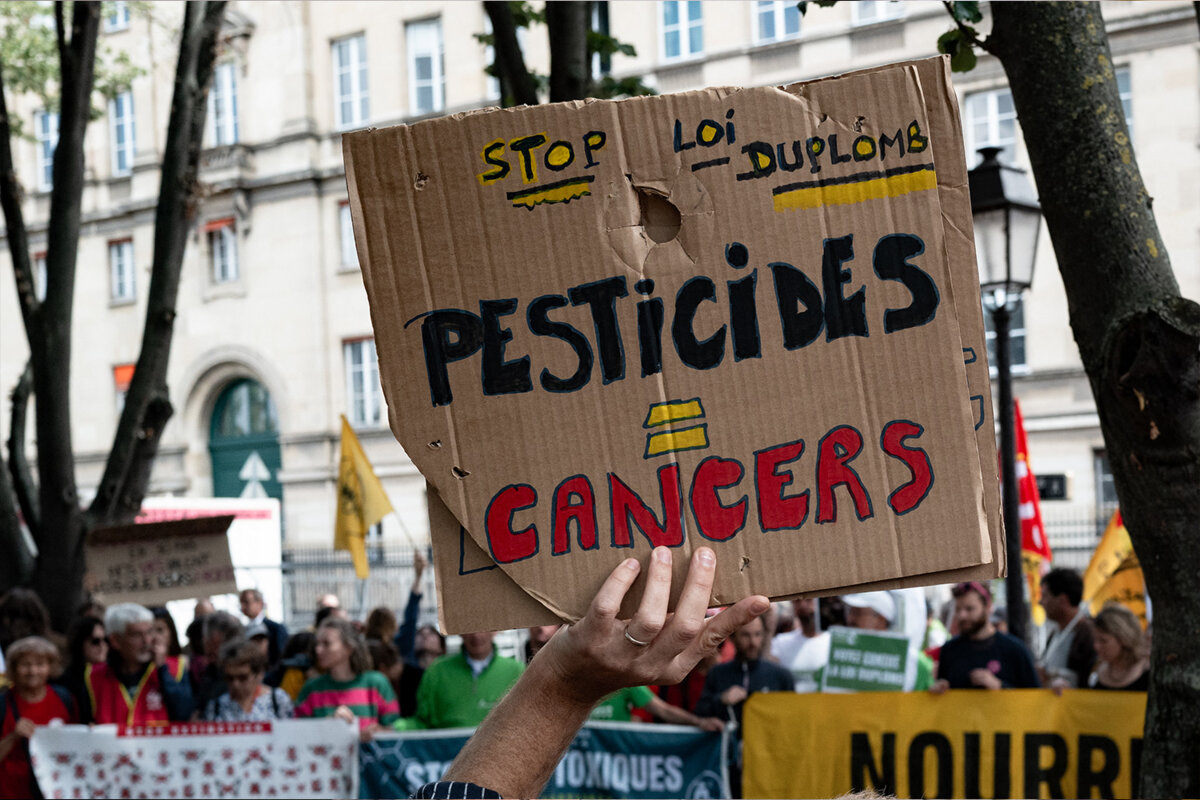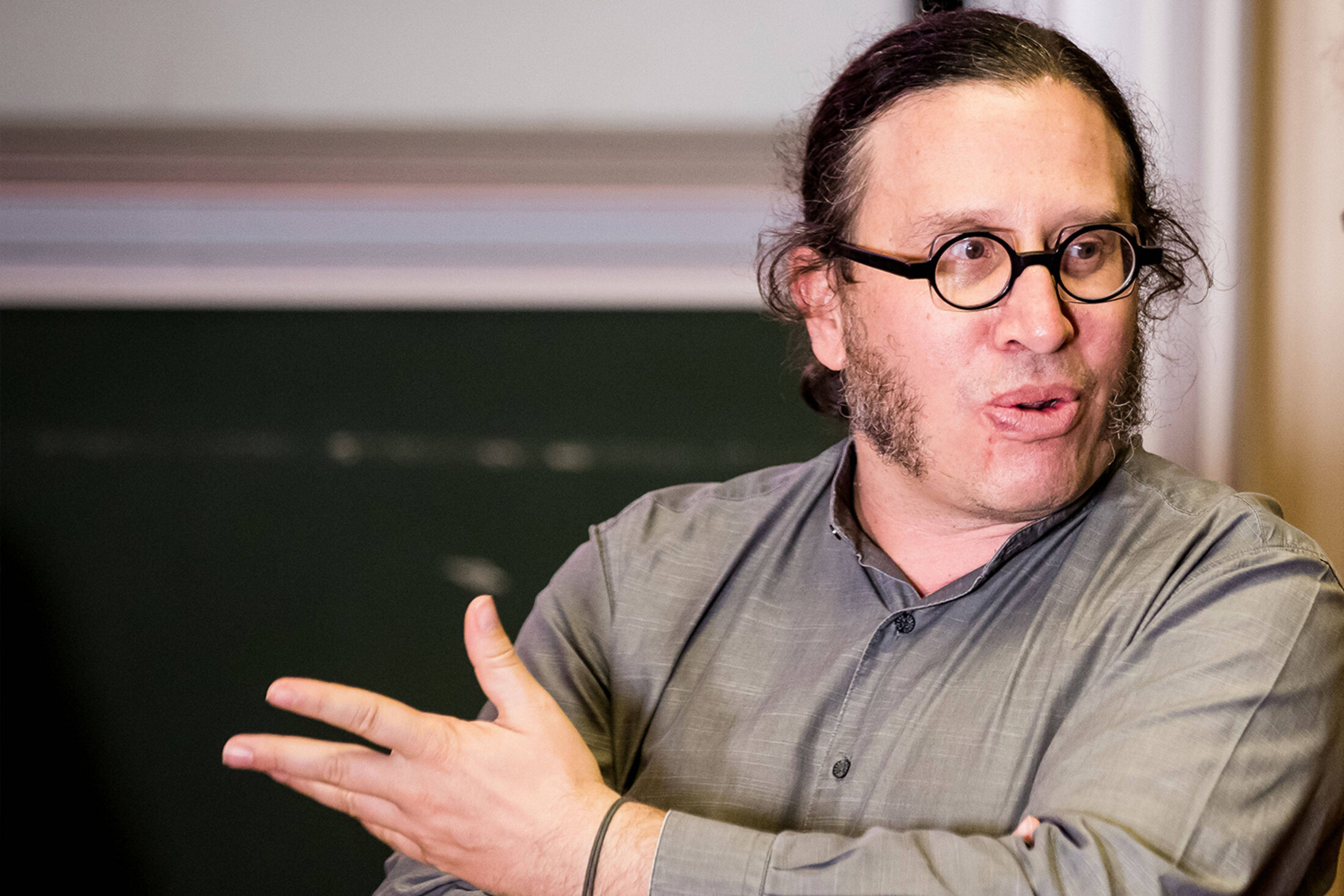A public petition has been launched in France against new farming legislation which was passed in controversial circumstances. Among other measures aimed at reducing “constraints” on the agricultural sector, the so-called 'loi Duplomb' will once again permit the use of acetamiprid, a neonicotinoid insecticide known to be harmful to pollinators such as bees.
By the time this article was first published, the petition had attracted 1.6 million signatures – and that number is now approaching two million. This is evidence, say observers, of a popular backlash after a vote on the legislation at the National Assembly on July 8th passed by 316 votes to 223, following a new procedure that blocked any parliamentary debate. This law and its restoration of the right to use certain neonicotinoids will have a major impact on public health and the natural world, as Fleur Breteau of the campaign group Cancer Colère has pointed out. Its controversial passage through the French Parliament has certainly inflamed passions; Members of Parliament on both sides of the debate have reported receiving harsh criticism and even being subjected to acts of intimidation.
Just as during the recent and controversial pension reforms, there is once again a huge gulf between the government’s plans and the people’s wishes. At a time of a backlash against policies on public health and biodiversity, the rapid success of this petition now restores some hope. It also seems to back the view of political scientist Vincent Tiberj, author of La Droitisation française. Mythe et réalités ('France's shift to the Right. Myth and realities') published by PUF in 2025, in which he argues that the “shift to the Right is both a real thing, in terms of it happening from above, and a myth, in terms of it happening from below”.

Enlargement : Illustration 1

Mediapart: Does the success of the petition against the loi Duplomb confirm, in your view, that the shift to the Right in France is not inevitable , or even that there is no shift happening “from below”?
Vincent Tiberj: First of all, it shows that people still have the power to come together quickly and in large numbers. It points to a deep change. There was a time when the system was such that citizens’ political participation went no further than voting, as political scientists Alain Garrigou, Yves Deloye and Olivier Ihl have well demonstrated. That was also a way to force people to simply be voters, and to stay quiet once the ballot box had spoken.
But that kind of what we call “reduced” citizenship no longer works, especially among the young and among those who might see themselves as on the Left. In its place, a more “assertive” kind of citizenship has emerged, one that uses all the tools it can to make itself heard – petitions, protests, social networks, and so on. The success of the “affaire du siècle” [editor's note, the 'case of the century' was climate litigation started by NGOs against the French state] and of the petition against the [2016] labour law, both of which drew more than a million signatures, had already showed the power of the people. The trouble is, we still have a system where this isn’t enough to overturn a law.
Mediapart: On the political front, doesn’t this also show resistance to the anti-environment drive seen in the rightwing broadcast media?
V.T.: On environmental issues, as with discrimination and social issues, there are far more “left-leaning” – or at least progressive – views in society than in the mainstream media. This raises the issue of whether the mainstream media can still represent France in all its diversity.
The loi Duplomb is the story of mainstream politics trying to impose its narrative.
And that includes farmers! Through the loi Duplomb, some farmers are trying to push their way of farming onto everyone else. Of course, the FNSEA is the main farming union, but it gets very low turnouts in its [editor's note, internal] elections. There are other ways to farm these days, there are real arguments within the farming world, but the main media only show one model, and the citizens are excluded from it. It's as if environmental awareness had never happened.
Mediapart: You explain how this shift to the Right is being pushed by the selection of certain issues and how they are spoken about. Associations seem to have succeeded in reframing the argument over the loi Duplomb by steering the debate toward health and nature rather than the competitivity of the agricultural model ...
V.T.: Exactly, and what's striking is that this reframing was done without going through the mainstream media. It clearly shows that, alongside what's being aired on the 24-hour news channels, people became informed about the loi Duplomb very quickly. Thanks to the associations' reach through their social networks, their know-how and through alternative news outlets – I’m thinking of Mediapart, but also Reporterre, Basta! and others – people have demonstrated quite impressive resistance.
For a long time these outlets were seen as secondary but they are now sources of information with a different kind of news, far better sourced and better structured. The loi Duplomb is the story of mainstream politics trying to impose its narrative, and of a society that's resisting this effectively thanks to its own antibodies.
Let’s not forget that sections of the CNRS [national research centre] came out against the loi Duplomb, and that there have never been so many well-educated people. Beyond the level even of degrees, they're able to seek out their own facts, and to deal with complex news. Not only do they watch what are sometimes long videos, they also read reports and carry out their own fact-finding in ways that are quite impressive.
Of course there are conspiracy theories. Of course there are fake news stories. Of course these get an audience. But against that, there are people who are getting better and better at spotting wrong information.
Mediapart: In your book, you also say there’s been a “great resignation” on the part of people who no longer want to leave things to elected leaders. Is this petition a sign of that?
V.T.: Yes, it shows that voting alone is no longer enough. Political scientist Ronald Inglehart was already speaking about this “silent revolution” back in the 1970s, but we’ve now crossed a line. There's now a clash between two kinds of democracy. On one side, you’ve got an elitist democracy, a democracy of elected representatives that still sees itself as speaking for the people, even though it no longer does.
In objective terms the members of the centrist bloc lost out in the 2024 [editor's note, parliamentary] elections, and just because they hold a majority in the Senate doesn’t mean they can act as if they have a majority among the people. That kind of democracy acts as if those who abstained had no opinion, and as if winning through a vote aimed at blocking the [far-right] Rassemblement National [from power] gives you the right to pursue your political programme with no questions asked.
The Right and the far-right don’t need to bother with this culture of citizenship.
And on the other side, you’ve got a bottom-up democracy, a people’s democracy, one that's of the new generations but not just them. The post-babyboomers, born in the 1960s and after, now form the bulk of the public and, quite clearly, they no longer identify with this “tacit acceptance”, as [French sociologist Pierre] Bourdieu once said about voting. We can see that, when a law like the loi Duplomb sails through the lawmaking process but is viewed by the public as illegitimate, there's a battle over the meaning of democracy. It was just the same with the pension reform.

Enlargement : Illustration 2

Mediapart: The Left hopes to counteract the public's 'great resignation' by calling for the loi Duplomb to be scrapped, as was tried with the pension reform. Could siding with the people, while the far-right Rassemblement National (RN) seems uncomfortable over its vote, end up working?
V.T.: That’s a real question for the future of the Left. At the moment, leftwing parties are still mostly parties of elected representatives and their aides. They are top-down machines. The challenge now is to create a new relationship between parties and the people, especially left-wingers or those who might identify with the Left. Part of the 'great resignation' stems from the fact that people were consistently let down by the Left. There was a sharp drop in trust between 2011 and 2013, just as [President] François Hollande came to power [editor's note, in 2012]. That rift has never healed, and no wonder: party political culture is still largely centred around the elites.
Yet there are far more people in environmental groups than in Les Écologistes [editor's note, the green party], just as there are far more in trade unions than in the parties that are supposed to speak for workers. So the leftwing parties need to reach outside themselves while still doing their job, that of shaping ideas and making their policies known, which both NUPES [editor's note, the broad-left alliance for the 2022 parliamentary elections] and the NFP [editor's note, the Nouveau Front Populaire, the broad-left alliance for the 2024 parliamentary elections] managed to do.
The task for these parties, who have the responsibility of representing the Left at the ballot box, is to speak to all the groups, unions and networks that represent the grassroots Left. What’s awful is that the Right and far-right don’t have to bother about this culture of citizenship. The people who back [rightwing interior minister] Bruno Retailleau and [far-right] Marine Le Pen want leaders. That’s not the case on the Left. It’s therefore much harder to rally that camp, but it’s also a far more stirring political project.
Mediapart: So there’s a shared interest for the grassroots Left and the top-down Left to come together…
V.T.: Even more so as a petition is a defensive response to a single issue, when there's actually a need to come together on a wider level. That’s why the Right and far-right try to split the Left on the race issue, on workers’ rights and on the green cause. For example, they push the concept of punitive green rules that come from and are for the elite, even though in truth environmentalism is a popular cause. Work needs to be done to bring together the cultural, economic and green wings of the Left, so they think about inequalities as a whole, not one against the rest.
That’s one of the flaws of environmental groups that don’t speak out on social inequalities, and of unions that struggle with green issues. But I feel it’s starting to come. Naturally, this all takes far more time than simply putting forward a candidate and believing in the idea of a providential figure connecting with the people. But it’s a lot more stimulating.
*
Vincent Tiberj, La Droitisation française. Mythe et réalités, published by PUF, 2024, 344 pages.
--------------------------------------------------------------------------
- The original French version of this interview can be found here.
English version by Michael Streeter


